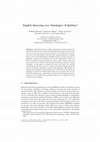Papers by Raffaella Bernardi
Logic Journal of IGPL, Jan 1, 2003
In a realistic Interactive Question Answering (IQA) setting, users frequently ask follow-up quest... more In a realistic Interactive Question Answering (IQA) setting, users frequently ask follow-up questions. By modeling how the questions' focus evolves in IQA dialogues, we want to describe what makes a particular follow-up question salient. We introduce a new focus model, and describe an implementation of an IQA system that we use for exploring our theory. To learn properties of salient focus transitions from data, we use logistic regression models that we validate on the basis of predicted answer correctness.
We aim to automatically induce a PoS tagset for Italian by analysing the distributional behaviour... more We aim to automatically induce a PoS tagset for Italian by analysing the distributional behaviour of Italian words. To this end, we propose an algorithm that (a) extracts information from loosely labelled dependency structures that encode only basic and broadly accepted syntactic relations, namely Head/Dependent and the distinction of dependents into Argument vs. Adjunct, and (b) derives a possible set of word classes. The paper reports on some preliminary experiments carried out using the induced tagset in conjunction with state-of-the-art PoS taggers. The method proposed to design a proper tagset exploits little, if any, language-specific knowledge: hence it is in principle applicable to any language.

Relational database (DB) management systems provide the standard means for structuring and queryi... more Relational database (DB) management systems provide the standard means for structuring and querying large amounts of data. However, to access such data the exact structure of the DB must be know, and such a structure might be far from the conceptualization of a human being of the stored information. Ontologies help to bridge this gap, by providing a high level conceptual view of the information stored in a DB in a cognitively more natural way. Even in this setting, casual end users might not be familiar with the formal languages required to query ontologies. In this paper we address this issue and study the problem of ontology-based data access by means of natural language questions instead of queries expressed in some formal language. Specifically, we analyze how complex real life questions are and how far from the query languages accepted by ontology-based data access systems, how we can obtain the formal query representing a given natural language question, and how can we handle those questions which are too complex wrt the accepted query language.
... MJ Moortgat Utrecht Institute of Lingusitics OTS Utrecht University Copyright c 2002 by Raffa... more ... MJ Moortgat Utrecht Institute of Lingusitics OTS Utrecht University Copyright c 2002 by RaffaellaBernardi. Printed and bound by Print Partners Ipskamp. ... Finally, last but not least, I am grateful to the Dutch weather for showing me the beauty of working hard! Raffaella Bernardi viii ...





Uploads
Papers by Raffaella Bernardi